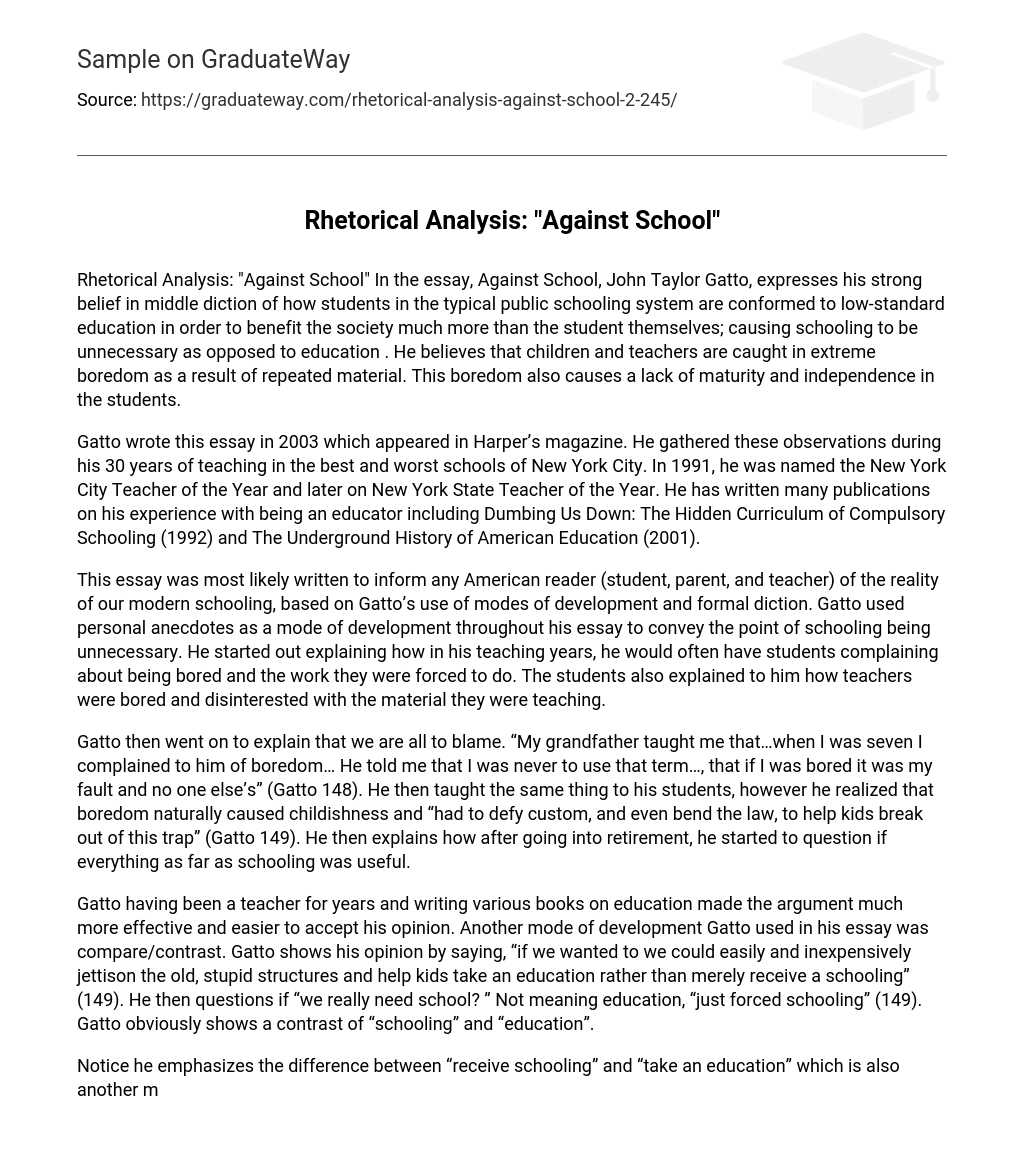Rhetorical Analysis: “Against School” In the essay, Against School, John Taylor Gatto, expresses his strong belief in middle diction of how students in the typical public schooling system are conformed to low-standard education in order to benefit the society much more than the student themselves; causing schooling to be unnecessary as opposed to education . He believes that children and teachers are caught in extreme boredom as a result of repeated material. This boredom also causes a lack of maturity and independence in the students.
Gatto wrote this essay in 2003 which appeared in Harper’s magazine. He gathered these observations during his 30 years of teaching in the best and worst schools of New York City. In 1991, he was named the New York City Teacher of the Year and later on New York State Teacher of the Year. He has written many publications on his experience with being an educator including Dumbing Us Down: The Hidden Curriculum of Compulsory Schooling (1992) and The Underground History of American Education (2001).
This essay was most likely written to inform any American reader (student, parent, and teacher) of the reality of our modern schooling, based on Gatto’s use of modes of development and formal diction. Gatto used personal anecdotes as a mode of development throughout his essay to convey the point of schooling being unnecessary. He started out explaining how in his teaching years, he would often have students complaining about being bored and the work they were forced to do. The students also explained to him how teachers were bored and disinterested with the material they were teaching.
Gatto then went on to explain that we are all to blame. “My grandfather taught me that…when I was seven I complained to him of boredom… He told me that I was never to use that term…, that if I was bored it was my fault and no one else’s”. He then taught the same thing to his students, however he realized that boredom naturally caused childishness and “had to defy custom, and even bend the law, to help kids break out of this trap”. He then explains how after going into retirement, he started to question if everything as far as schooling was useful.
Gatto having been a teacher for years and writing various books on education made the argument much more effective and easier to accept his opinion. Another mode of development Gatto used in his essay was compare/contrast. Gatto shows his opinion by saying, “if we wanted to we could easily and inexpensively jettison the old, stupid structures and help kids take an education rather than merely receive a schooling”. He then questions if “we really need school? ” Not meaning education, “just forced schooling”. Gatto obviously shows a contrast of “schooling” and “education”.
Notice he emphasizes the difference between “receive schooling” and “take an education” which is also another mode, extended definition. Another compare/contrast he shows in the essay is how a number of American heroes were never involved in a school system, yet they still were incredibly smart and managed to succeed while making an indent in history. But now in the modern world “we have been taught in this country to think of ‘success’ as synonymous with, or at least dependent upon, ‘schooling’, but historically that isn’t true in either an intellectual or a financial sense”.
This also is indeed a very effective argument, simply because he uses factual history and the modern world to show a compare and contrast. Gatto uses middle diction throughout his essay to target a variety of audiences, but mostly geared toward parents of all education and class. For example he gives the six basic functions of modern schooling, while also explaining them in detail as opposed to just naming the functions and having only the knowledgeable audience know what is being said, as what would happen in a formal diction essay. Another example was, as shown before, the difference between school and education.
Gatto clearly broke it down in case someone of lesser knowledge would take it in the wrong context. He also uses simple terms, for example “we must wake up to what our schools really are…” where he could have said for formal diction “our society needs to seize a point of reality in understanding what the true nature of modern schooling is about”. This also is a very effective strategy Gatto used. He was able to reach a variety of audiences to further his opinion of modern schooling, so people could come to reality and start making a change.
As a member of public schooling, therefore a member of the targeted audience, I can much relate to his opinions. Having just transferred, as a junior, to a community college from a public school that has very low standards, I can very well relate. There was much boredom and I felt like I was wasting much of my time in high school. This essay definitely raised a brow on me and I surely want to start making a difference as far as “schooling” and “education” in America.





